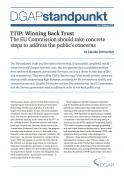The European Union and the United States have been negotiating the Transatlantic Trade and Investment Partnership (TTIP) since July 2013. It is the EU’s largest free-trade project to date and, if successfully completed, would create the world’s largest economic zone. The German government in particular has spent decades pitching such a treaty with the US – so far, without success. Numerous summits and bodies have been created over the years (most recently the Transatlantic Economic Council in 2007), but progress has only been moderate. In 2011, in the wake of the financial crisis and persistent economic weakness, the Americans, too, became interested in a project of this scope. TTIP now appears to parties on both sides of the Atlantic as a unique opportunity for creating an ambitious transatlantic agreement to create growth and jobs. After a phase of initial enthusiasm, however, the negotiations started to move very sluggishly, and the European public – particularly in Germany – is increasingly hostile to the project.
Treaty supporters like the European Commission and the European governments promote, above all, the growth and welfare gains that could come from dis- mantling tariffs and non-tariff trade barriers. At the same time, TTIP represents an opportunity to establish new rules in such new areas as investment, energy, and e-commerce – rules that could also be integrated at a later date into the WTO’s regulatory framework. Finally, TTIP would strengthen Europe’s strategic partnership with the United States and balance out its “pivot to Asia” and especially the Trans-Pacific Partnership (TPP) trade agreement that is currently under development.
However, a large portion of the European public – particularly in Germany – sees TTIP as a threat to its values and way of life. The fact that numerous studies (conducted by the London-based Centre for Economic Policy Research, 2013, among others) have pointed out that about 80 percent of TTIP’s gains would come about through the elimination of non-tariff trade barriers – that is, through the elimination of standards and norms. This awakens fears that TTIP will lead to lower standards – heightened by the basic distrust that many Europeans currently feel toward the Americans, especially since the NSA scandal and the Snowden Affair. The mutual recognition and future harmonization of standards are being equated with lower standards, or standards that are downright bad. Fears are expressed that “chlorine- washed chicken” and hormone-treated meat will now have to be imported to Europe (where they will be ingested by Europeans) and that genetically modified organisms (GMOs) will find their way into Europe’s food supply.
On top of this, concerns are also starting to cluster around the issue of investor-state arbitration proceedings. Many NGOs, alongside parties like the Greens and the Social Democrats in Germany, have raised the alarm that corporations would be able to bypass the courts through secret arbitration processes – undermining democracy – and that standards set by the government for the environment, health, and consumer protection could be surreptitiously cancelled out. When a June 2014 headline in the German weekly DIE ZEIT asked “Will the Americans soon rule over us?” it voiced the concerns of many TTIP critics.
The European Commission, which has long pitched the treaty as a win-win situation, has been very slow to respond. It hopes to turn around public opinion with its new face – that of Cecilia Malmström of Sweden, who became EU trade commissioner in November 2014 – and a new transparency campaign. The TTIP mandate was published in the fall of 2014, and textual proposals and position papers are made increasingly available to a broader public. At the same time, the Commission and the German government are working to reassure the public that high European standards of consumer, environmental, and health protection will not be low- ered; that GMO laws will not be changed; and that public services will not be touched, among other measures. So far none of this has done much to sway the public. Rather, opponents countercharge that TTIP is a “secret treaty” whose promises have no credibility and merely protect the interests of large corporations (and Americans).
The main problem here is trust. What is the right way to respond in a situation like this one, marked so strongly by wariness of the EU Commission, European integration, of the Americans, of globalization (and, as the case may be, free trade)? How to win the public’s support?
The circumstances may be difficult, but taking the following points into account will help:
- The EU Commission justifies TTIP on its website by stressing the economic advantages of the treaty. These are primarily based on macroeconomic studies conducted by Centre for Economic Policy Research (2013) and the Ifo Institute for Economic Research (2013), which generate relatively low welfare gains in very ambitious scenarios (and whose estimates partially extend beyond the level of the single market). The European Commission must bear these results in mind and show clearly which industries and sectors stand to gain, while also acknowledging where the problems are. Otherwise, the one-sided emphasis on TTIP’s positive economic effects will seem implausible.
- More than anything else, the issue of food safety standards is at the heart of anti-TTIP sentiment. Here, too, it is not enough to repeatedly state that the European “right to regulate” will not be compromised and that the standard of protection will remain intact. There are already suspicions about the treaty’s main objectives, and bland generalizations will not alleviate them. The chief negotiators need to be more specific. Where in the agricultural sector could one, for exam- ple, picture liberalizations or concessions (for instance in dismantling tariffs and subsidies, or recognizing testing methods). And where are the non-negotiable no-go areas (for example, safety assessments)? A vet- erinary equivalency agreement between the EU and the US was signed in July 1999. This, too, can serve as an example of where mutual recognition is possible and where it is not. At the same time, it should be stated as often as possible that American standards – even in an area like food safety – are basically very high. For example, American laws regulating raw milk and flavoring agents are in fact much stricter than their European counterparts.
- In addition to these concerns, arbitration has been a major stumbling block. The European Commission initiated a public consultation on this issue and the responses were predominantly negative. Even if 97 percent of its 150,000 responses came via vari- ous online platforms (with pre-formulated negative responses), the Commission must take these concerns into account. If arbitration is to be included in TTIP, then the public needs to be convinced of its benefits.To do so means, first of all, addressing the current state of arbitration proceedings. How often are complaints filed? What are the costs? Are there infringements on the government’s right to adopt measures intended to protect the public? Have there been cases of abuse? What do the solutions look like? Here it is also important to keep in mind the two ongoing cases with the greatest impact on public opinion: Vattenfall vs. Germany (over the country’s phase-out of nuclear power) and Philip Morris vs. Australia (over plain cigarette packaging). Second of all, the shortcomings and dangers that have been identified need to have consequences for the design of the arbitration process in TTIP. The European Commission must make clear reform proposals, which should then be presented as non-negotiable. Among other things, these should include safeguard clauses in such sectors as environ- mental, health, and consumer protection as well as clear and transparent procedures and possibilities for revision.
- For its part, the German government must make clear that the debate surrounding TTIP and opposition to it are partially related to its national concerns and sensitivities. The European Commission negotiates on behalf of the EU’s 28 member states. In particular, peripheral member states hit hardest in the euro crisis take a decidedly more positive stance toward the treaty. When Germans argue that arbitration processes are unnecessary because the German judicial system is perfectly adequate, they forget that the situation is different in the EU’s younger and less developed member states. Nine bilateral investment treaties (BITs) between the US and EU countries (including Bulgaria, Croatia, Poland, Romania, and the Czech Republic) are already in operation. These countries are convinced that recognized arbitration procedures will help make them more attractive to investors.
- Last of all, the transparency initiative should be taken a good deal further. The new EU Trade Com- missioner Cecilia Malmström has already started a new chapter in the Commission’s relationship with the public. This can and should be intensified. Only with a fresh start will there be a chance of winning back lost trust in the benefits of the treaty.
Dr. Claudia Schmucker is head of the DGAP’s Globalization and World Economy Program. Contact: schmucker@dgap.org.
This text was published in Cicero (in German) on March 2, 2015.

